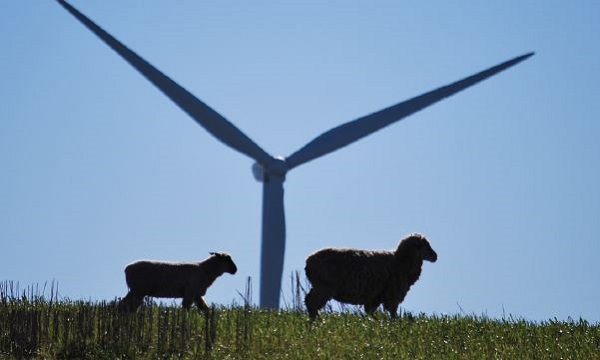For a long time, the wind industry operated pretty much with impunity when it came to its impact on golden eagles and other birds. Those days could be coming to an end.
In California, the Obama administration is pushing an operating 102-megawatt wind power plant to accept a first-ever permit under the Bald and Golden Eagle Protection Act that would allow for five eagle fatalities over a five-year period – but at the same time, EDF Renewable Energy, owner of the Shiloh IV plant in the Sacramento Delta region, would be required to undertake a host of conservation and mitigation measures, including retrofitting 133 power poles in southern Monterey County that are considered high risk to both bald and golden eagles.

“If these steps were taken, the wind project would have no significant impact on eagle populations in the area, while reducing the emission of greenhouse gases and helping California meet its goals of 33 percent of its energy from renewable energy,” the U.S. Fish and Wildlife Service said of its preferred alternative contained in a draft environmental assessment [PDF] unveiled for public comment last week.
The Fish and Wildlife Service’s preferred alternative is more stringent than the one proposed by EDF Renewable Energy, both in the number of power pole retrofits required and in the frequency of monitoring for bird deaths.
The golden eagle is protected under the federal Bald and Golden Eagle Protection Act, but the act’s application — or, perhaps better put, non-application — to the wind industry has been a fuzzy area of regulatory enforcement that the Obama administration has been struggling to bring clarity to.
Many eagles have been killed by wind turbines, dating back through several presidential administrations. But with wind’s big expansion during the Obama presidency and under pressure from conservation groups, the Fish and Wildlife Service has been pressuring the wind industry to get permits to “take” eagles. As the service explains:
Under the Eagle Act, the Service can issue eagle permits to entities whose activities may result in “take” of eagles that is unintentional and incidental to otherwise lawful activities. “Take” means to pursue, shoot, poison, wound, kill, capture, trap, collect, destroy, molest or disturb eagles, their nests or their eggs. Wind energy companies are not required to have an eagle permit. However, companies operating without an eagle permit risk federal penalties, including criminal prosecution, under the Eagle Act for any unauthorized take of eagles.
The idea is that along with the permit to take a small number of eagles, the company would have to develop a plan that would not only result in minimizing harm to the birds, but also prevent deaths elsewhere such that there is actually no loss to the eagle population.
Information on how to comment on the draft environmental assessment can be found at the end of this Fish and Wildlife Service press release.